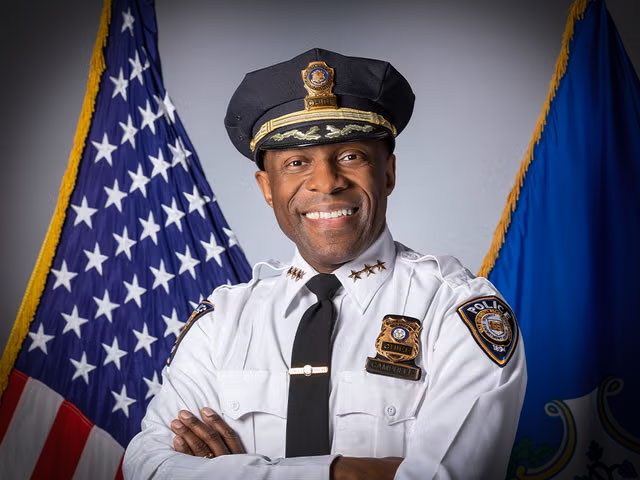
News
Summers Will Not Finish Semester of Teaching as Harvard Investigates Epstein Ties

News
Harvard College Students Report Favoring Divestment from Israel in HUA Survey

News
‘He Should Resign’: Harvard Undergrads Take Hard Line Against Summers Over Epstein Scandal

News
Harvard To Launch New Investigation Into Epstein’s Ties to Summers, Other University Affiliates

News
Harvard Students To Vote on Divestment From Israel in Inaugural HUA Election Survey
Harvard Brings On Yale Police Chief Anthony Campbell To Lead HUPD

Updated November 13, 2025, at 2:18 p.m.
Anthony Campbell will leave his post as Yale University’s police chief to serve as the next chief of the Harvard University Police Department, the University announced Thursday.
Campbell will leave a 27-year career in New Haven law enforcement, stepping into his tenure at HUPD on Jan. 5. His appointment concludes a six-month search to replace former HUPD Chief Victor A. Clay, who abruptly resigned last May amid allegations of workplace toxicity and ineffective management.
Campbell first joined the Yale Police Department in 2019 as an assistant chief and was promoted to lead the force in 2022. He previously served as chief of the New Haven Police Department, in which he worked for two decades. Campbell, who also holds a position as a Yale Divinity School lecturer, earned two degrees from Yale — a Master of Divinity from the divinity school, and a B.A. in religious studies.
Executive Vice President Meredith L. Weenick ’90 praised Campbell’s “extensive experience” in law enforcement in a Thursday statement to the Harvard Gazette, a University-run publication.
“His track record reflects his personal and professional commitment to building strong, collaborative relationships between officers within a police department and their communities,” Weenick said.
Campbell will be tasked with regaining the trust of a historically fractured department — one often plagued by low morale and high turnover under Clay. In the weeks prior to Clay’s resignation, the union representing HUPD officers said they lacked confidence in his leadership in a near-unanimous vote.
A Crimson investigation later found that, in his wake, Clay left behind labor disputes, toxic workplace allegations, and legal threats. More than a dozen officers have left the department since 2021, the year Clay became chief, and some cited his leadership style as a reason for their departures.
Campbell will replace two-time interim chief Denis G. Downing, who has led the department since Clay’s resignation in May. Downing previously led the department in 2020 after former chief Francis D. “Bud” Riley stepped down following a Crimson investigation that detailed repeated sexist and racist incidents in his department.
At Yale and NHPD, Campbell emphasized collaboration between police and residents to prevent crime and oversaw NHPD’s introduction of body cameras during his 20 months leading the department
Campbell’s course at Yale Divinity School was titled “Police Others as You Would Want to Be Policed: The Changing Face of Community-Police-Ministry Relations in the Twenty-First Century,” and he told the Yale Daily News in a 2009 interview that he saw policing as a way “to minister to people in need.”
Still, YPD’s civilian-run Police Advisory Board quietly dissolved in 2024 — though Campbell later committed to restoring the board.
Campbell also oversaw the arrests of 48 people, including 44 Yale students, at a pro-Palestine encampment on the school’s Beinecke Plaza in 2024. At Harvard, a similar pro-Palestine encampment dispersed peacefully after organizers reached an agreement with University President Alan M. Garber ’76, and Clay defended students’ right to protest during the occupation, saying the encampment was peaceful.
Campbell justified the arrests in an email to YPD officers, later released after a request under Connecticut’s public records law, that described incidents at the Yale encampment as “criminal and violent.” In other messages, he pointed to a Jewish student’s allegations that protesters blocked her path across the plaza as well as to several confrontations between protesters and counterprotesters.
As NHPD chief, Campbell also managed a department that has recently struggled with understaffing, with nearly 100 of 495 budgeted positions in the department going unfilled in 2018, according to a Yale Daily News report at the time. His last two years at YPD were marked by strained contract negotiations between the Yale police union and the university.
The union voted to authorize a strike in June, but no strike took place, and the union ratified a new contract in October.
—Staff writer Matan H. Josephy can be reached matan.josephy@thecrimson.com. Follow him on X @matanjosephy.
—Staff writer Laurel M. Shugart can be reached at laurel.shugart@thecrimson.com. Follow them on X @laurelmshugart.
Want to keep up with breaking news? Subscribe to our email newsletter.
